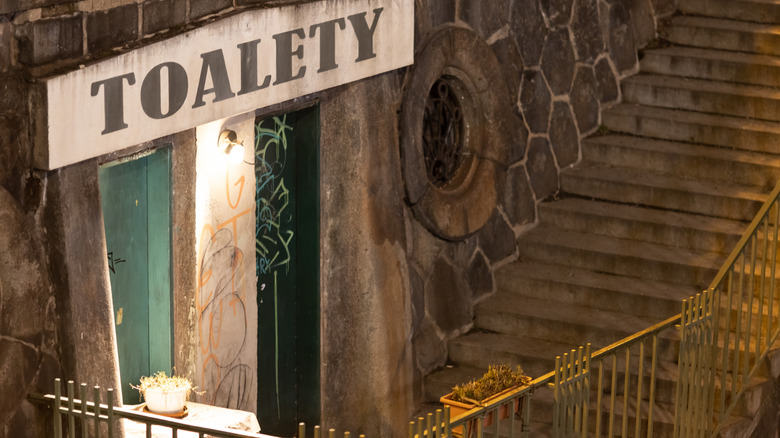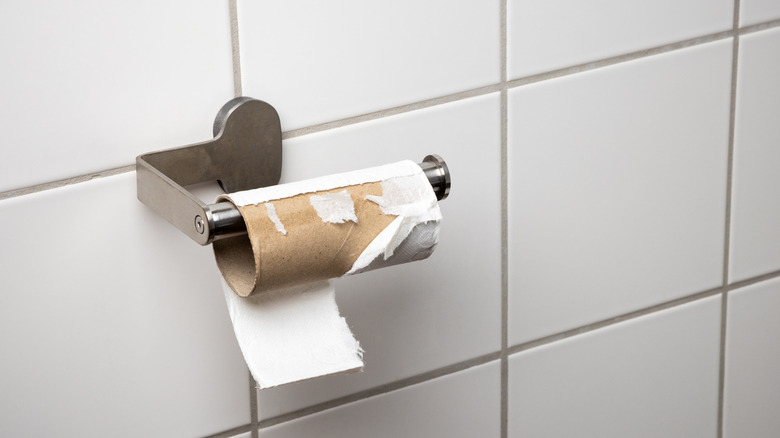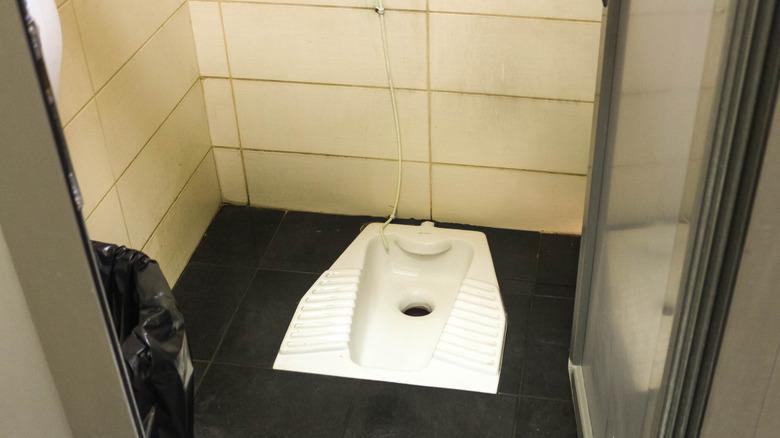The Common Feature Missing From Many Public Bathrooms In Europe, Per Rick Steves
During the dark days of the coronavirus pandemic, some consumers not only stockpiled food and hand sanitizer, but also toilet paper. The panic-buying caused shortages in some countries and revealed one thing about human nature: If we are going to get caught with our pants down during a global crisis, we don't want it to happen without a supply of TP on hand. Although billions of people around the world have other methods for their bathroom hygiene, the situation revealed how toilet paper is something we simply refuse to live without in the western world. Yet as Rick Steves warns on his website, it isn't something you should take for granted in European public restrooms.
Our love affair with toilet paper is relatively new: It only became commercially available in the mid-19th Century. For the vast majority of human history, people had other ways of freshening up after a visit to the smallest room in the house. Bronze Age Europeans made do with leaves, while in ancient Greco-Roman times, a communal sponge on a stick (rinsed in salt water or vinegar) was the go-to method. People throughout the Middle Ages used scraps of cloth, moss, straw, or simply their bare hands, before Joseph Gayetty of New York came through with his game-changer in 1857. Other innovations followed, such as perforated toilet rolls in 1890, "splinter-free" paper in 1930, and luxurious two-ply arrived in 1942. Now toilet paper is such a common convenience, why isn't it guaranteed in European WCs?
Don't always expect toilet paper in European restrooms
Rick Steves notes that while Europeans definitely use toilet paper, it doesn't necessarily mean there is a plentiful stock in public toilets. Generally speaking, it is assumed that you will come equipped with your own, and it's a bit of a lottery whether paper will be provided or not. "If you're averse to the occasional drip-dry," Steves writes, "carry pocket-size tissue packs (easy to buy in Europe) for WCs sans TP." Always a good idea to avoid an embarrassing bathroom mistake.
One unexpected thing you need to know about toilets in Europe is that you might need to pay a small fee for the privilege. In theory, you get a reasonable standard of cleanliness in return, and an attendant who might dole out some tissue if it is not provided in the cubicles. In other scenarios, entry might be free but you might need to ask the attendant for some paper. This can be a fraught exchange because these gatekeepers might be somewhat rude and don't always speak English.
If you are blessed with an abundance of toilet paper, don't assume it is okay to go wild and flush huge wads of it down the pan. Plumbing in some countries, like Greece and Turkey, isn't always the most adept at handling anything other than human waste, and flushing tissue could potentially cause a blockage. There will often be signs on the wall warning you not to clog the loo and to use the provided wastepaper basket instead.
Other toilet oddities to watch out for in Europe
Rick Steves also discussed other strange toilet differences in Europe. For one, if you are unaccustomed to European bathroom breaks, you might assume that the toilets are all the same as back home. That isn't always the case. Tons of toilets in Italy don't have a seat, which means your best bet is lining the rim with toilet paper if you prefer to sit rather than hover. Some countries, like Germany, still have flat flusher toilets in older restrooms. This system has a porcelain "shelf" in the bowl that catches excrement before the flush washes it away. Although this might seem gross to some, there is a good healthy reason: It enables the user to check things out and make sure everything is in order.
One thing that may cause alarm in some parts of Europe is squat toilets, which can be tricky if you aren't used to the correct technique. While they are more common in Asian countries, you may come across them in places like France, Greece, and Albania. Some squatties may have a flush mechanism while others simply provide a bucket of water, tap, or hose to wash things down. If toilet paper is provided, you should dispense with it in a wastepaper basket rather than toss it down the toilet. Squatting may feel awkward for people who are used to a comfortable seat, but it has its benefits. Research shows that squatting makes it easier to take care of number two with less strain on the abdomen. Happy flushing!


